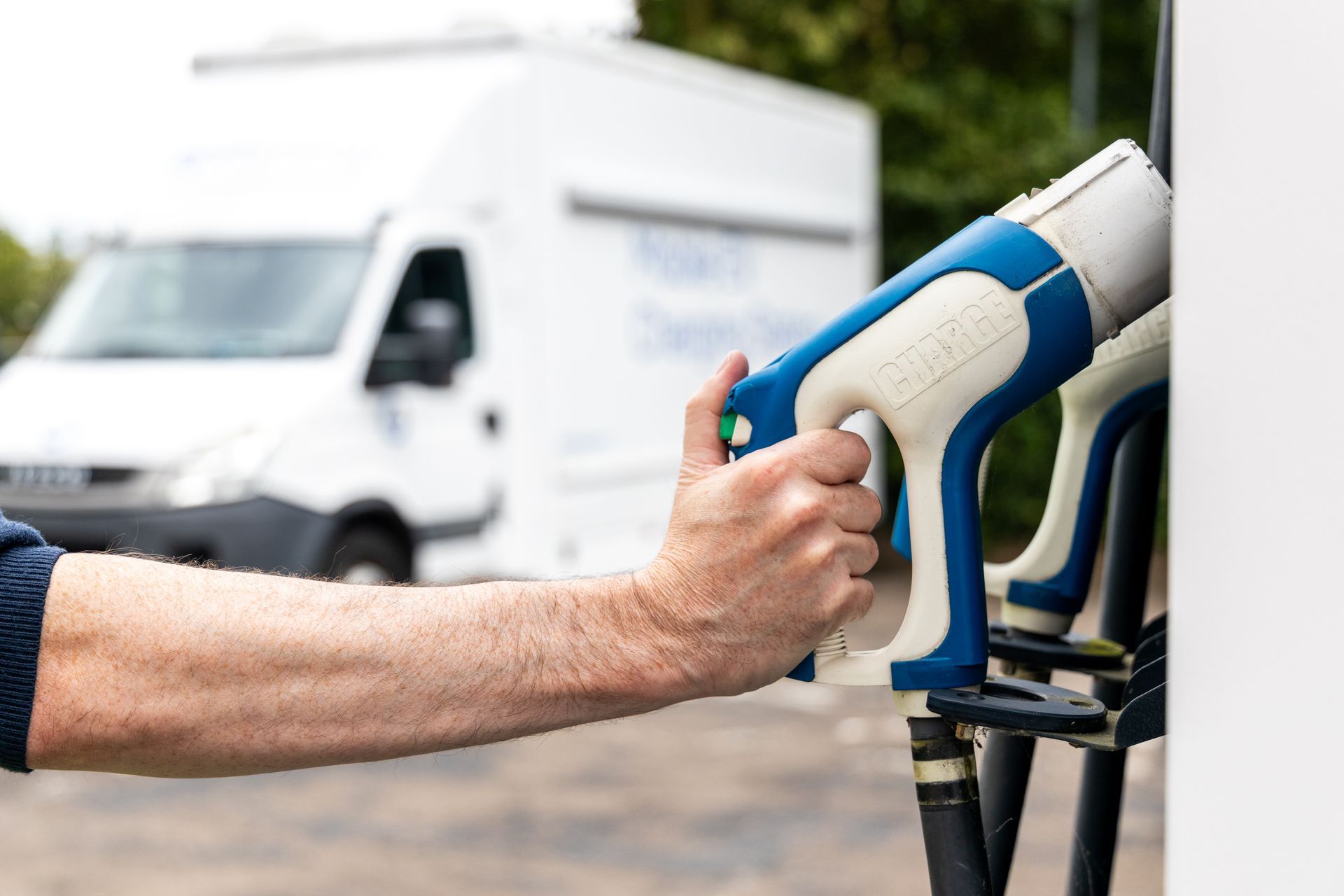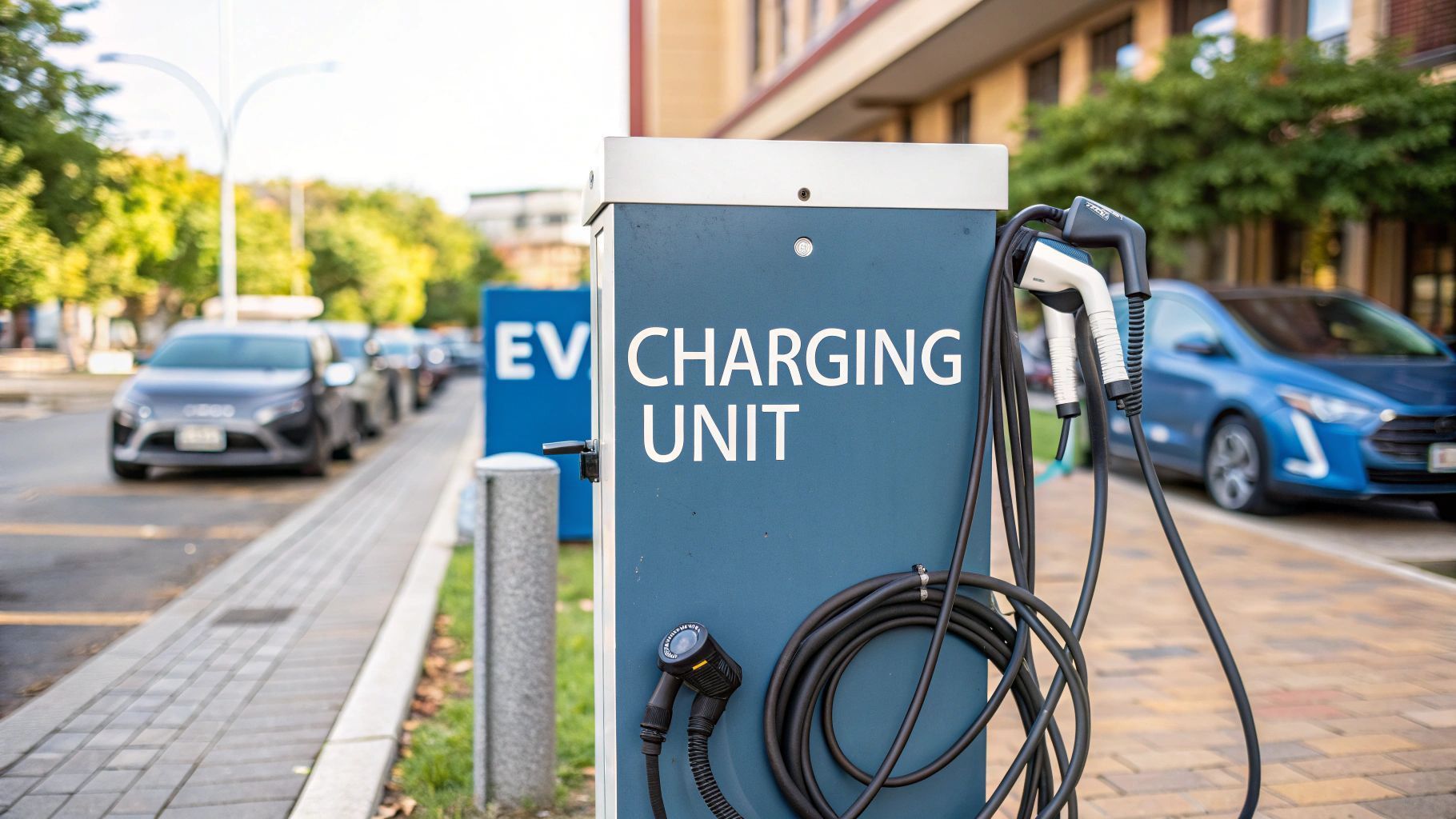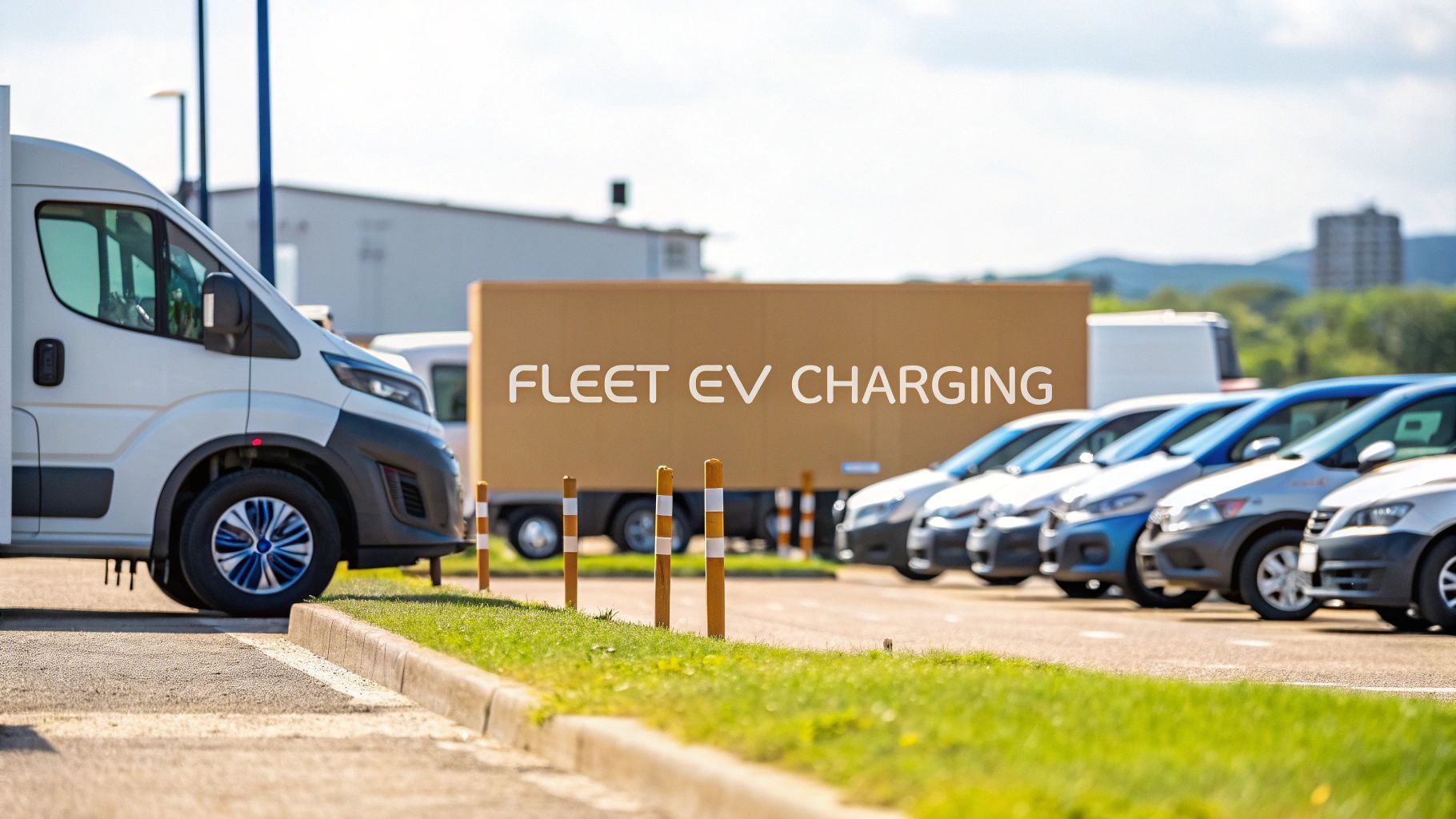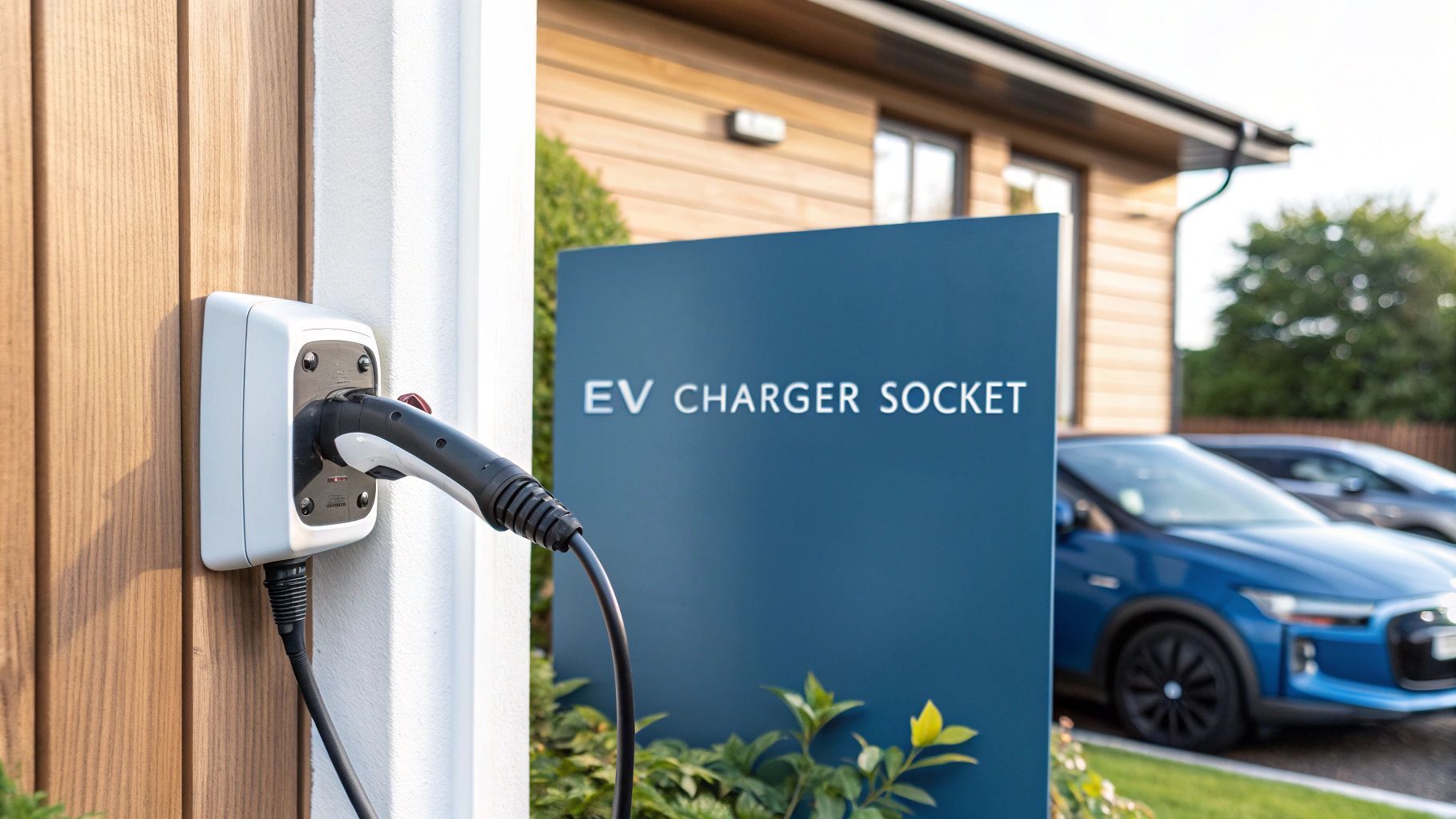UK Mobile EV Charging Service Guide
Picture this: you’re driving your electric vehicle through the picturesque British countryside, miles from the nearest town, when the dreaded battery warning light begins to flash. This is the exact scenario that fuels ‘range anxiety’—a very real fear that holds many back from fully embracing electric mobility.
A mobile EV charging service is the answer to this exact problem. Think of it as the modern equivalent of a jerrycan for the electric age. It’s an on-demand power service that comes directly to your EV, wherever it’s parked, eliminating the stress of finding a fixed charging point when you’re running low.
The End of Range Anxiety
Mobile EV charging isn’t here to replace the growing network of static chargers. Instead, this on-demand solution acts as a crucial safety net, transforming a potentially journey-ending emergency into nothing more than a minor inconvenience.
Instead of waiting for a recovery truck to tow your car to the nearest station, a specialised van arrives and provides a direct top-up. It's enough to get you back on your way swiftly, whether that's to your destination or the next available charging point.
Advantages for the EV Driver
For the individual driver, the benefits are immediate and obvious. The peace of mind that comes from knowing help is just a phone call away is huge. This service proves its worth in several common situations:
- Emergency Roadside Assistance: Misjudged your range? Found a planned charging stop is out of order? A mobile service provides just enough power to get you moving again.
- Ultimate Convenience: Imagine arriving at a busy city-centre car park only to find every charging bay is taken. A mobile service can top up your vehicle while you work or shop, without you needing to move it.
- Access in Remote Areas: It effectively fills the gaps in the UK's charging infrastructure, especially in rural or remote locations where fixed points are still few and far between.
A mobile EV charging service isn't just about electricity; it's about delivering confidence. It assures drivers they can travel freely without the constant fear of being stranded, turning 'what if' into 'no problem'.
Earning Potential for Operators
The advantages extend powerfully to the business operator too, making this a genuinely lucrative venture. An operator of a mobile charger can build multiple revenue streams, with the primary income coming from a call-out fee combined with a per-kilowatt-hour (kWh) rate for the energy supplied. As an example, a standard emergency call-out could generate £70-£150 per job.
Beyond that, operators can create profitable B2B contracts with commercial fleets, like delivery companies or taxi services. These subscription-based models provide a steady, predictable income by offering scheduled daily or weekly charging, keeping fleets operational without the need for expensive fixed infrastructure at their depots.
The financial model is robust and as EV adoption grows, the demand for this essential service is set to increase exponentially. It's clear this service is key to making sure drivers feel confident on the road and finally ending range anxiety.
Navigating the UK's EV Charging Network
To really get why a mobile EV charging service is becoming so essential, you first have to understand the reality of the UK's public charging network. On one hand, it's growing at a fantastic rate. On the other, it's still plagued by gaps and frustrations that leave many electric vehicle drivers wanting. It’s these very challenges that create the perfect opening for mobile charging to step in.
The government and private companies are certainly pushing hard. As of April 2025, the UK had 76,507 public charging devices up and running. But dig into that number and a different picture emerges. The vast majority—a whopping 56% , or 42,874 devices—are slower chargers rated between 3kW and 8kW. Fine for an overnight top-up, but not much help when you're on the move and need a quick boost.
In fact, only 20% of the entire network offers the fast charging speeds of 50kW or more that drivers actually need. This highlights a critical mismatch between what's available and what's practical. It's a story of rapid growth running alongside persistent, real-world limitations.
This is the core idea of a mobile EV charging service in a nutshell—bringing the power directly to the vehicle, wherever it may be.
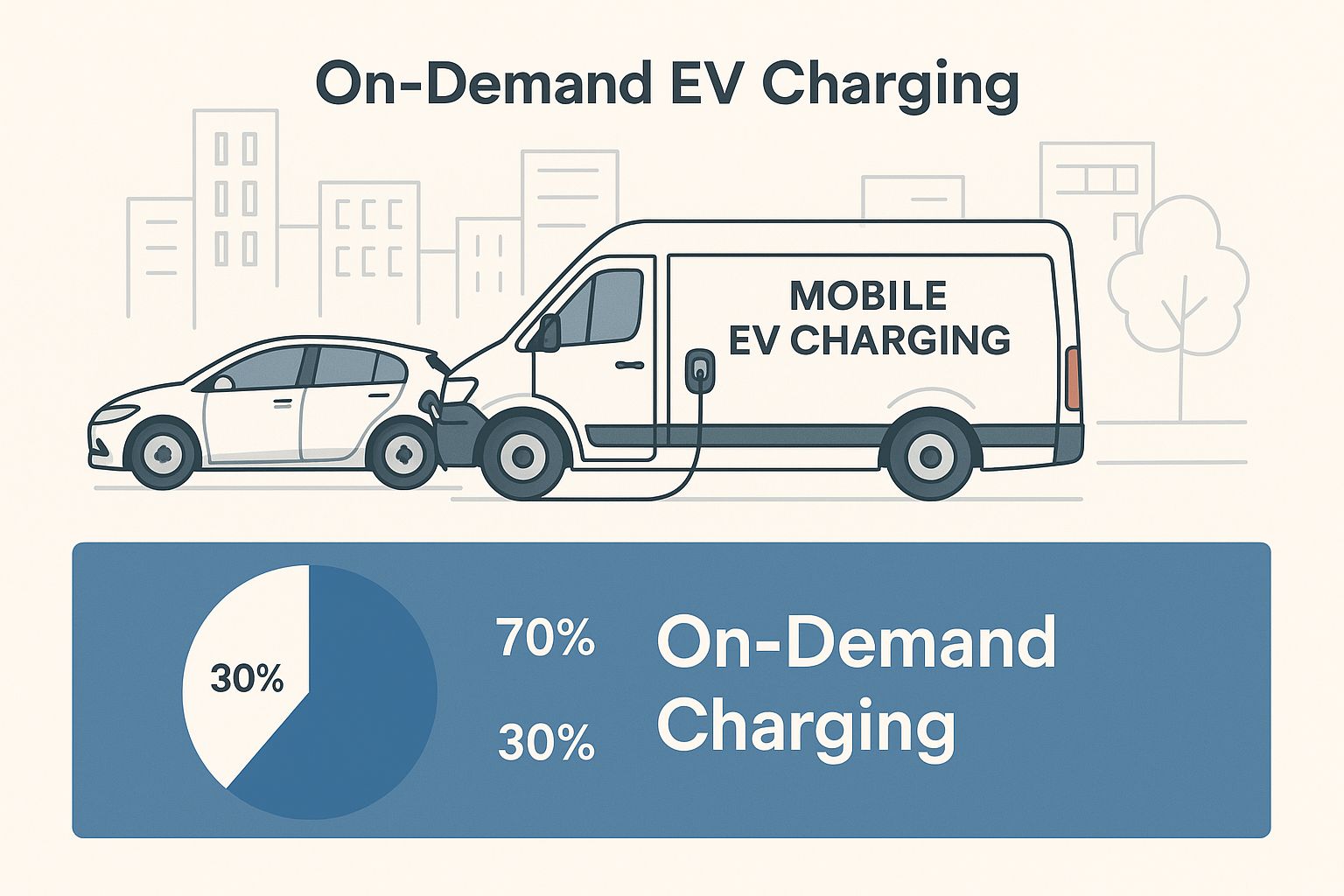
As the image shows, it’s about flipping the script and bringing the charger to the car, neatly sidestepping the flaws of a fixed network.
The Problem of 'Charging Deserts'
One of the biggest headaches for EV drivers is the existence of ‘charging deserts’. These are areas, especially in rural and more remote parts of the UK, where public charge points are few and far between—or simply do not exist at all. This patchiness creates a huge barrier to EV ownership and is a major source of range anxiety for residents and visitors alike.
But the problem is not just out in the sticks. Even in supposedly well-served towns and cities, pulling up to a charging hub only to find every single bay occupied is an all-too-common frustration. This is particularly tough for drivers who cannot charge at home because they do not have a driveway or dedicated parking space.
The reality for many EV drivers is a postcode lottery. Your ability to charge conveniently often depends entirely on where you live, work, or travel, creating an inconsistent and sometimes stressful experience.
A quick look at the official Department for Transport map confirms this patchy coverage.

You can clearly see the clusters around major cities and motorways, but also the vast areas with noticeably fewer options. These are the charging deserts, plain and simple.
Filling the Gaps in the Network
These real-world pain points prove that a fixed infrastructure, no matter how much it expands, will always have its limits. It’s just not practical or affordable to install a static charger on every street corner or in every remote beauty spot. This is precisely where a mobile EV charging service shifts from being a simple convenience to an absolute necessity.
Mobile charging delivers a flexible, on-demand solution that tackles these challenges head-on.
- Serving Remote Locations: A mobile unit can get to drivers in charging deserts, offering a lifeline where no fixed points exist.
- Easing Congestion: It can service cars in busy car parks or on streets where all the bays are full, saving drivers a ton of time and hassle.
- Providing Emergency Power: If a driver misjudges their range and runs flat, a mobile service is the EV equivalent of a recovery truck, delivering enough power to get them to the next charger.
By filling the gaps that a fixed network inevitably leaves behind, mobile EV charging becomes a vital piece of the puzzle in building a truly comprehensive and user-friendly national charging system. It supports the ever-growing number of EV drivers and helps make the switch to electric mobility smoother for everyone. You can learn more by exploring our detailed guide to understanding the UK's public EV charging point networks in 2025.
The Powerful Advantages of Mobile Charging
So, what makes bringing the charger directly to the car such a game-changing idea? A mobile EV charging service offers some seriously powerful advantages for both individual drivers and businesses. It completely flips the script on the relationship between a driver and their vehicle's energy needs, shifting from a frustrating search for power to having it delivered right on demand.
Think of it like ordering a takeaway for your car. Instead of driving to a restaurant (a fixed charging point), finding a parking space and waiting, the food (electricity) is brought directly to you, wherever you are. This simple analogy gets to the heart of what a mobile EV charging service offers: ultimate convenience and freedom.
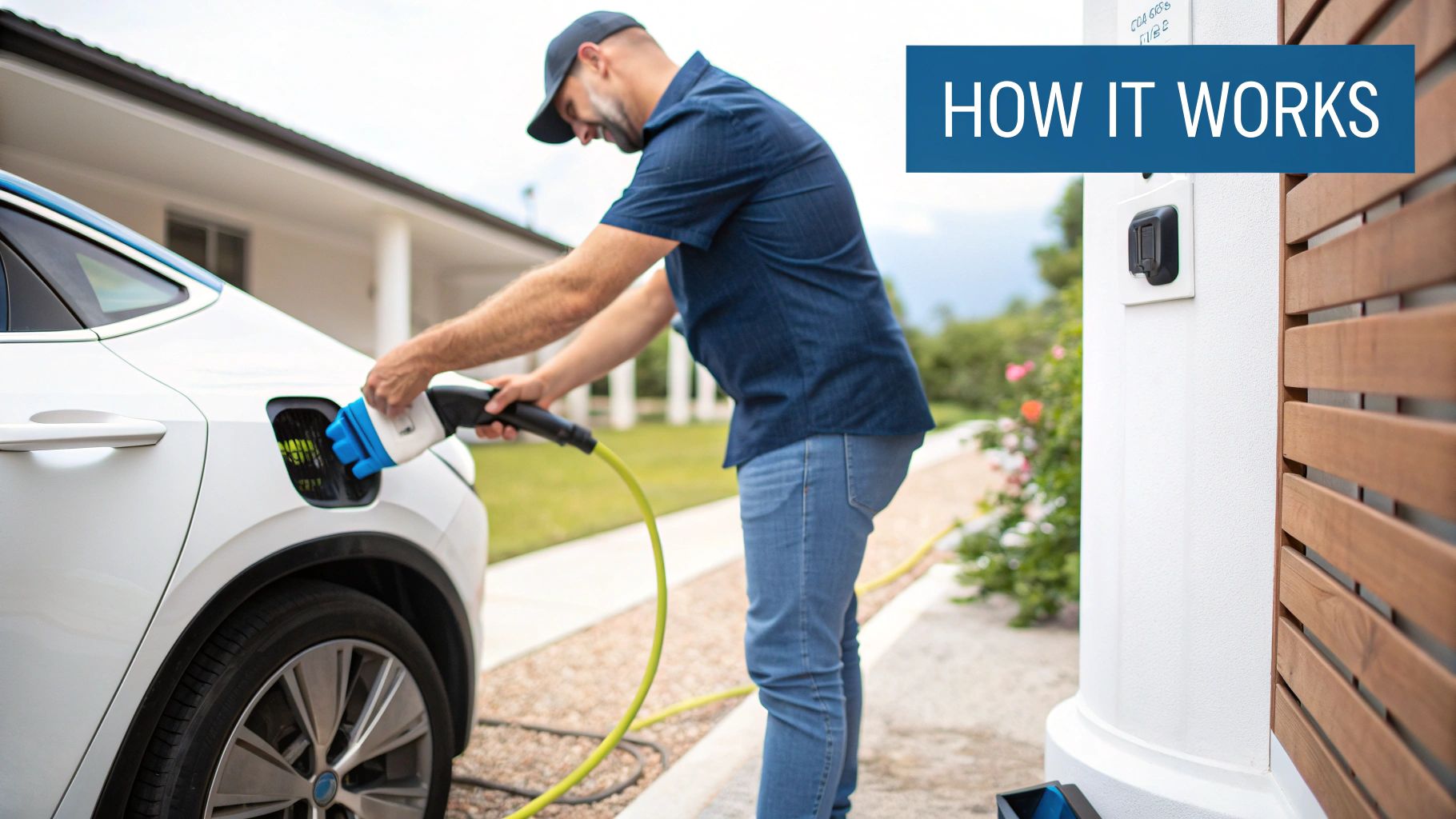
This on-demand model is an immediate fix for common EV frustrations. We've all been there—finding every single bay occupied in a busy city-centre car park, or worse, being stranded in a remote beauty spot with no charger in sight. Mobile charging turns that logistical headache into a simple background task.
Unlocking Flexibility for Businesses
For businesses, the advantages are even more strategic, especially for fleet operators and property managers. Jumping into a mobile charging model allows them to sidestep many of the biggest hurdles to electrifying their fleet.
Let's be honest, installing fixed charging infrastructure is a massive undertaking. It demands huge capital investment, drags you through lengthy planning permission processes and involves disruptive groundworks. A mobile service completely removes these headaches, offering a solution that’s both immediate and scalable.
By bringing charging directly to the vehicles, businesses can avoid the high upfront costs and operational complexities of building and maintaining their own charging depots. It’s a capital-light approach that grows in line with the fleet.
This kind of flexibility is crucial. A business can start with a small EV fleet and scale its charging provision as more vehicles are added, without ever needing to dig up a car park. The rapid advancements in various battery and charging technologies are what make these mobile units increasingly feasible and efficient.
Tapping into a Lucrative Market
For an operator, the financial incentives are hard to ignore. The UK’s mobile electric vehicle charging services are gaining serious traction, particularly in rural and semi-rural regions where static infrastructure is thin on the ground.
It’s a massive untapped market. Despite the UK having over 68,000 potential sites suitable for EV charge points, fewer than 1% currently have any operational infrastructure. A staggering 79% of these potential sites are in rural or semi-rural areas, highlighting a huge underserved population. A mobile charging business can go straight to this demand, turning infrastructure gaps into pure profit.
This creates a clear business opportunity. Operators can generate substantial revenue through a mix of call-out fees and per-kWh energy sales. For instance, a single emergency roadside assistance call-out can bring in between £70 and £150 .
The real prize, though, lies in B2B contracts. An operator can build lucrative subscription models with businesses that need reliable, consistent charging for their fleets.
- Taxi and Ride-Sharing Services: Provide scheduled top-ups during driver breaks or overnight, making sure vehicles are always ready for the next fare.
- Last-Mile Delivery Fleets: Offer overnight or early morning charging at depots, which cuts out downtime and the need for expensive electrical upgrades.
- Commercial Property Managers: Offer charging as a premium amenity for tenants in office blocks or residential buildings that lack dedicated charging bays.
These B2B contracts create a stable, recurring revenue stream, making a mobile EV charging service a highly profitable and scalable business. It’s a model that solves real-world problems for both drivers and businesses, positioning operators for huge success in the booming EV market.
Calculating Your Earning Potential
Let's get straight to the question on everyone's mind: how much can you actually make running a mobile EV charging service? While the final numbers will always depend on your location, business model and how efficiently you operate, the potential is huge.
This is not just a side hustle. For the right entrepreneur, it’s a seriously profitable, full-time business venture ready and waiting in the UK market.
The financial model is so strong because it’s built on several different revenue streams. Instead of putting all your eggs in one basket, you can blend different services to boost your daily takings and create a robust business that serves all kinds of customers.
Primary Revenue Streams
The bedrock of your income will likely come from three core services. Each one targets a different corner of the EV market and when you combine them, they create a powerful earning strategy.
- Emergency Call-Out Fees: This is your most immediate source of cash. When an EV driver gets stranded, you’re their roadside hero. A standard call-out fee can be anywhere from £70 to £150 and that’s just for showing up.
- Per-kWh Energy Pricing: On top of the call-out fee, you charge for the electricity you deliver. This is typically priced at a premium compared to a fixed charger, which is fair enough given the on-demand convenience you’re providing.
- B2B Fleet Subscriptions: Here’s where the long-term, stable income really kicks in. Landing contracts with commercial fleets—think delivery firms, local taxi companies, or even council vehicles—gives you predictable, recurring revenue you can count on, month after month.
The real financial power of a mobile EV charging business is its diversity. By mixing high-margin emergency jobs with the steady cash flow from B2B contracts, operators can build a profitable and scalable company from the ground up.
Hypothetical Earnings Projection for a Single Mobile Charging Van
To bring this to life, let's run some numbers for a single van operation. This simple, hypothetical model shows how just a few jobs a day can translate into significant monthly revenue, based on a 22-day working month.
| Metric | Low-Demand Scenario (3 jobs/day) | Medium-Demand Scenario (6 jobs/day) | High-Demand Scenario (9 jobs/day) |
|---|---|---|---|
| Average Revenue per Job | £95 (Call-out + Energy) | £95 (Call-out + Energy) | £95 (Call-out + Energy) |
| Total Daily Revenue | £285 | £570 | £855 |
| Total Monthly Revenue | £6,270 | £12,540 | £18,810 |
Even in the low-demand scenario, with just three jobs a day, the monthly revenue is nothing to scoff at. For operators in busy cities or those who’ve secured a solid fleet contract, hitting the medium or high-demand figures is perfectly achievable. That puts a six-figure annual turnover within reach from just one vehicle.
Factoring in Your Expenses
Of course, revenue is only half the story. To figure out your actual profit, you need to account for your operating expenses. The good news is that for a mobile charging business, these costs are generally predictable and easy to manage.
Your main outgoings will be:
- Vehicle Costs: This covers the fuel (or electricity for an electric van), insurance and regular maintenance like new tyres and servicing.
- Energy Costs: The price of the electricity you're selling. You can keep this low by charging your mobile unit overnight on a cheaper off-peak tariff.
- Software and Admin: Any fees for your booking and payment system, plus basic accounting or admin tools.
Once you subtract these costs, what's left is your net profit. With a smart pricing strategy and a bit of operational savvy, a mobile EV charging service offers some very healthy profit margins. This model gives you a clear route to profitability.
If you’re ready to get started, you can explore the different ways to get your operation off the ground in our guide on finance for EV chargers . By getting a handle on both the income potential and the costs, you can build a solid business plan and step confidently into this fast-growing industry.
Launching Your Mobile Charging Business
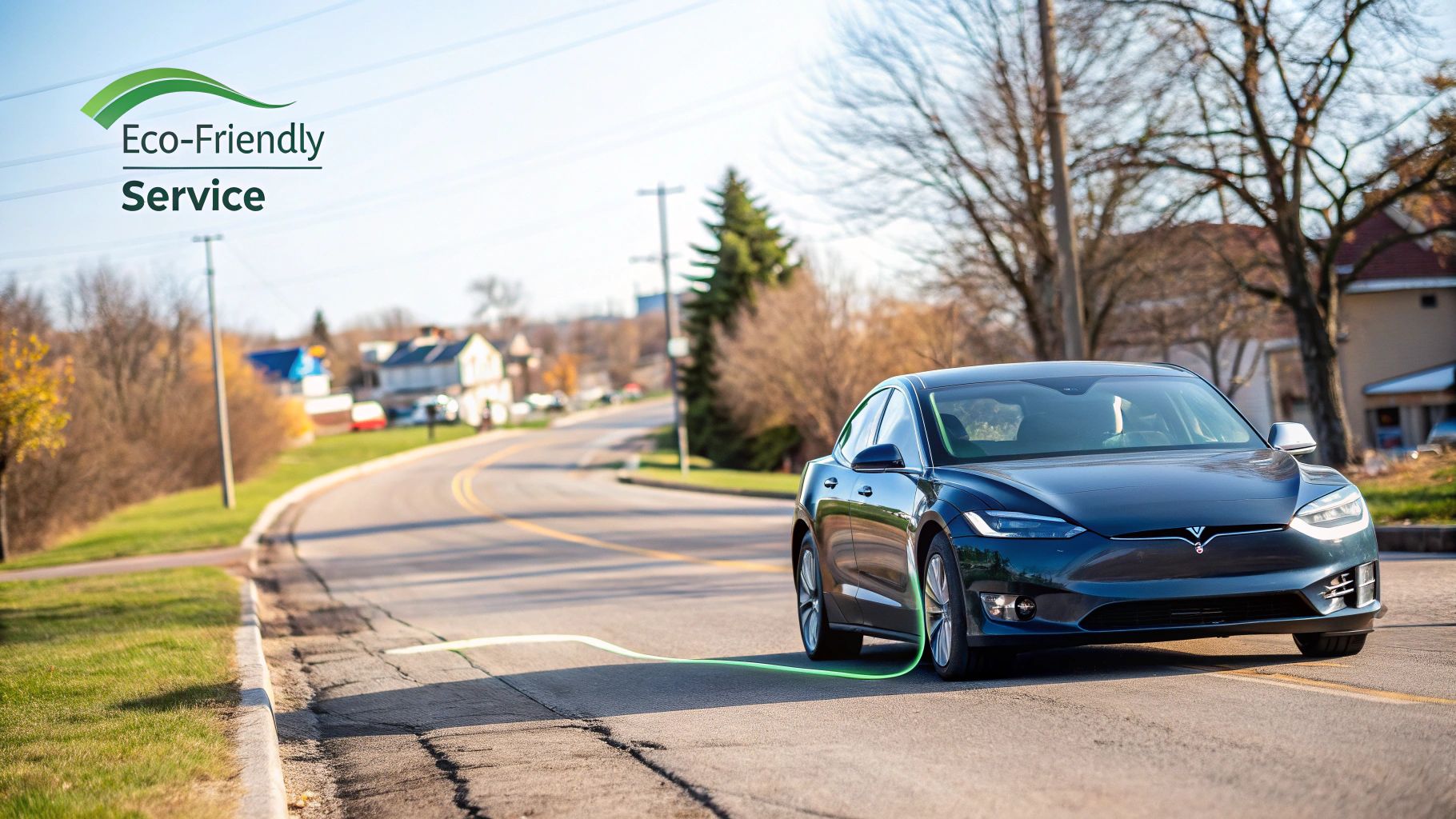
Turning the idea of mobile EV charging into a real, profitable business is more straightforward than you might imagine. With a solid strategy, you can build a successful service from the ground up. It all starts with choosing the right business model for your goals and the area you plan to serve.
There are three main paths you can take and each one caters to a different corner of the market. Getting this right from day one is key, as it will shape everything from your operations to your marketing.
Choosing Your Business Model
The most familiar route is the Business-to-Consumer (B2C) model. Think of it as the modern-day roadside assistance service for EVs. You respond to individual drivers who are stranded with a flat battery or just need a convenient top-up at home or work. This model is often driven by emergency call-outs and can bring in high-margin work, but it can also be less predictable.
Another option is to focus on the Business-to-Business (B2B) market. This involves setting up contracts with commercial fleets—think delivery companies, local councils, or taxi services. This approach offers a stable, recurring revenue stream from scheduled charging sessions, which makes it much easier to forecast your income and manage logistics.
Finally, there's the hybrid model , which blends both B2C and B2B services. This approach gives you the best of both worlds: the steady, reliable income from fleet contracts, plus the higher-margin opportunities from one-off emergency jobs. It lets you tap into the entire market and really maximise your earning potential.
A robust business plan needs to pinpoint your primary audience. Are you going to be the go-to emergency service for individual drivers, or the trusted charging partner for local fleets? This decision will influence every single part of your operation.
Your Startup Checklist
Once you’ve settled on a model, it’s time to get practical. Here’s a simple checklist to get your mobile EV charging service off the ground smoothly.
- Register Your Business and Secure Insurance: Get your company formally registered and make sure you have the right public liability and commercial vehicle insurance. This is non-negotiable for operating legally and protecting your business.
- Select the Right Equipment: Your two biggest assets will be your van and your mobile charging unit. A vehicle like a Ford Transit gives you plenty of space, while a certified DC fast charger is essential to provide a meaningful amount of range quickly and efficiently.
- Implement a Powerful Software Platform: This is the heart of your operation. Good software is crucial for managing bookings, dispatching your van, processing payments and tracking your earnings. It streamlines everything, setting you up for efficient growth.
You really cannot overstate the importance of a solid operational backbone. With the right systems in place from the very beginning, you can focus on what matters: delivering an excellent mobile EV charging service and growing your customer base.
The market is certainly ready for it. The UK’s public charging infrastructure is growing at an incredible pace to support the expanding EV ecosystem. Between January and July 2025 alone, the number of public devices increased by approximately 12% , rising to a total of 82,002 . This rapid deployment supports the ever-growing UK EV fleet, reflecting an integrated approach where mobile services are needed to perfectly complement static installations. You can explore the official data on the UK's charging network expansion here.
Why the Future of EV Charging Is Mobile
Thinking of mobile EV charging as just a roadside recovery service is selling it short. It’s actually a glimpse into a fundamental shift in how we’ll refuel our vehicles. As the UK barrels towards its 2030 goal of phasing out new petrol and diesel cars, the number of EVs on our roads is set to explode. This is going to put enormous pressure on a fixed charging infrastructure that’s already struggling to keep up.
The future is not just about building more charging posts; it’s about creating a smarter, more flexible energy network. And a mobile EV charging service is perfectly positioned to become a critical piece of that new ecosystem.
Emerging Trends and Technologies
The technology packed into these mobile units is constantly getting better, driven by some seriously exciting breakthroughs. We’re moving beyond simple rescue missions and into an era of proactive, intelligent energy delivery on wheels.
Here are a few key developments shaping what’s next:
- Advanced Battery Technology: The power packs inside mobile units are becoming denser and more efficient all the time. For instance, ongoing advancements in solid state battery technology promise to deliver even faster charging speeds from smaller, lighter units.
- AI-Powered Dispatching: It will not be long before sophisticated software can predict charging demand in real-time. By analysing traffic data, event schedules and even weather patterns, operators can send vans to anticipated hotspots before they’re needed, cutting down wait times and making the whole operation run smoother.
- Vehicle-to-Grid (V2G) Integration: Picture this: in the future, mobile charging units could not only deliver power but also pull it back from vehicles when demand is low. A fleet of these mobile units could then act as a distributed energy storage network, helping to balance the national grid and even creating a new revenue stream for operators.
Mobile charging is evolving from a reactive service into a proactive energy solution. It will play a vital role in managing grid stability and meeting the dynamic energy demands of a fully electric transportation network.
A Critical Role in Tomorrow's Transport
As the EV market grows up, the demand for charging that’s both accessible and convenient is only going to get louder. Fixed infrastructure will always have its limits, whether due to high costs, planning red tape, or just a lack of physical space.
Mobile charging neatly sidesteps these problems. It offers a solution that can scale up and be deployed exactly where it’s needed, right when it’s needed.
For operators, this translates into a business model with enormous long-term growth potential. The market is not just viable today; it’s on track to become an essential—and highly profitable—part of the UK’s future transport system. In short, mobile charging is the agile, intelligent answer to the rigid challenges of a fixed network.
A Few Common Questions
If you're thinking about the world of on-demand EV charging, a few questions naturally pop up. Let's tackle some of the most common ones to give you a clearer picture of how a mobile EV charging service works, both for the driver and the business owner.
How Much Does A Mobile EV Charge Cost The Driver?
When you’re stuck with a dead battery, the last thing you want is a complicated bill. That’s why the pricing is kept simple and fair. It’s usually broken down into two parts: a call-out fee and a per-kWh rate for the energy itself.
The call-out fee is much like any other roadside assistance service – it covers the cost of getting the specialised charging unit out to you. The per-kWh charge is for the juice that goes into your battery. Put them together and the total is often around the same price—or even less—than getting towed to the nearest fixed charger on a flatbed truck.
What Key Equipment Do I Need To Start This Business?
Kicking off a mobile charging business is not like starting a simple delivery service; you're becoming an on-demand energy provider. That means you need the right professional-grade tools for the job.
The essentials boil down to a few core items:
- A Suitable Commercial Vehicle: Think of something like a Ford Transit. You’ll need enough space for the charging unit and all the necessary safety gear.
- A Certified Mobile DC Fast Charger: This is the heart of your operation. It has to be powerful enough to deliver a meaningful amount of range quickly and safely.
- A Robust Software Platform: This is your command centre. It handles everything from dispatching jobs and talking to customers to processing payments securely.
On top of this, you’ll need to invest in proper safety equipment for your operators and get comprehensive business insurance sorted.
Starting a mobile charging business is about more than just a van and a charger; it’s about building a reliable, professional service. The right equipment and software are the foundations of your operational efficiency and long-term profitability.
Is A Mobile Charging Business Profitable In The UK?
Yes, absolutely. Running a mobile EV charging service in the UK can be a very profitable business. Your earning potential really depends on a few things: how many jobs you can complete in a day, the population density of your service area and the type of business model you adopt.
While on-demand emergency calls provide a great source of revenue, the real key to predictable, long-term profit is often in B2B contracts. Partnering with commercial fleets, like delivery firms or taxi companies, gives you a stable, recurring income stream. It creates a financially solid foundation for your business, putting you in a great position for growth as EV adoption continues to climb across the country.
Ready to join the future of on-demand energy? ZAPME provides the industry-leading mobile charging units and software platforms you need to launch a successful mobile EV charging service. Discover our complete business solutions at https://www.zapme.biz.

